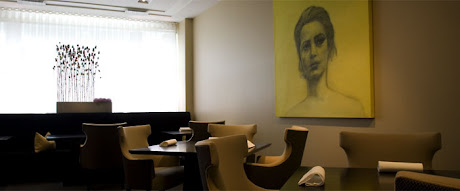For humans, the act of eating has always been characterized by ritual, no matter how spontaneous or impulsive the effort. And in a wide sweeping attempt to chronicle the development of civilized dining, it can be argued convincingly that the rules of food consumption eventually lead to the conduct of human behavior. Table manners are social agreements emphasizing that no one will intrude upon others' sensitivities. To share food is the ultimate in social behavior because it implies the forging of a family relationship although the event may last only for a short time. In some cultures, it is correct to be silent while eating . . . in others, one must continue to talk (we have met not merely to eat, but also to commune with fellow human beings).
From this perspective, it is overwhelmingly evident that manners in deportment, behavior and speech will follow and that conforming to such rules, decreed or implied, creates harmony, orderliness and class distinctions and, in excess, snobbery. Are we witnessing a deterioration of these structures that is inevitably linked with growing chaos in our society?
Modern manners increasingly force us to be casual . . . Politeness, whether formal or informal, has always involved manipulating social distance. The kind of politeness that we call formality deliberately keeps people apart. Its purpose is partly to prevent prying and to slow down the process of familiarization in order to give each party time to appraise the other. Modern society has more than enough devices for keeping people apart. We sleep in separate rooms, live and eat in separate quarters, move around within the closed doors of metal vehicles . . . When we meet, therefore, with the express purpose of socializing, we cannot afford to be distant.
Manners are not always restrictive. They also pressure people into behaving in predictable fashion: when we know what to do and expect, we can interact on occasions, relying upon the rules of politeness to deal with the apprehensions of meeting others, making decisions, conferring, parting and commemorating. Rituals are there, to make difficult passage easier.
"Manners" govern relationships with other people primarily in situations of close personal contact; they do not constitute virtue, but they do set out to imitate virtue's outward appearance. They are an admission of an ideal.
Upwardly Mannered

Your Starting Place for Social, Political and Economic Advancement
Who we Serve
Academics: Universities and Colleges, Trade and Art Schools, Prep Schools, Public Schools, Foundations, Youth Centers, Rehabilitative Institutes
Hospitality: Estate Managers, Hotels, Country Clubs, Restaurants, Salons, Spas, Resorts
Athletics: Professional, Collegian, Olympians, Dancers, Sports Agents, Managers
Entertainment: Agents, Promoters, Managers, Personal Assistants, Guilds, Actors, Musicians
Corporations: Technology, Law, Medical, Fortune 500 Companies, Professional Societies, Executive Management
Government and Private Sector: Lobbyist, Electoral Campaigns, Chambers, Special Interest, Alternative and Minority Classes, First Generation Wealth, Growth Seeking Entrepreneurs, Social and Professional Climbers
Hospitality: Estate Managers, Hotels, Country Clubs, Restaurants, Salons, Spas, Resorts
Athletics: Professional, Collegian, Olympians, Dancers, Sports Agents, Managers
Entertainment: Agents, Promoters, Managers, Personal Assistants, Guilds, Actors, Musicians
Corporations: Technology, Law, Medical, Fortune 500 Companies, Professional Societies, Executive Management
Government and Private Sector: Lobbyist, Electoral Campaigns, Chambers, Special Interest, Alternative and Minority Classes, First Generation Wealth, Growth Seeking Entrepreneurs, Social and Professional Climbers
Programming
Seminars and Work Shops in Culinary Instruction (Food, Wine, Liquor and Cigar), Professional Series, Counseling, Image Consulting, Impression Management, Athletic and Entertainment Marketing Imagery
Contact Us
For you and your companies immediate growth and development or to answer your questions about our lifestyle programs, call 518-926-0331 or email us at: sbmiii@hotmail.com
Soon to Come
Our website is currently under construction and will be actively running in October 2011








